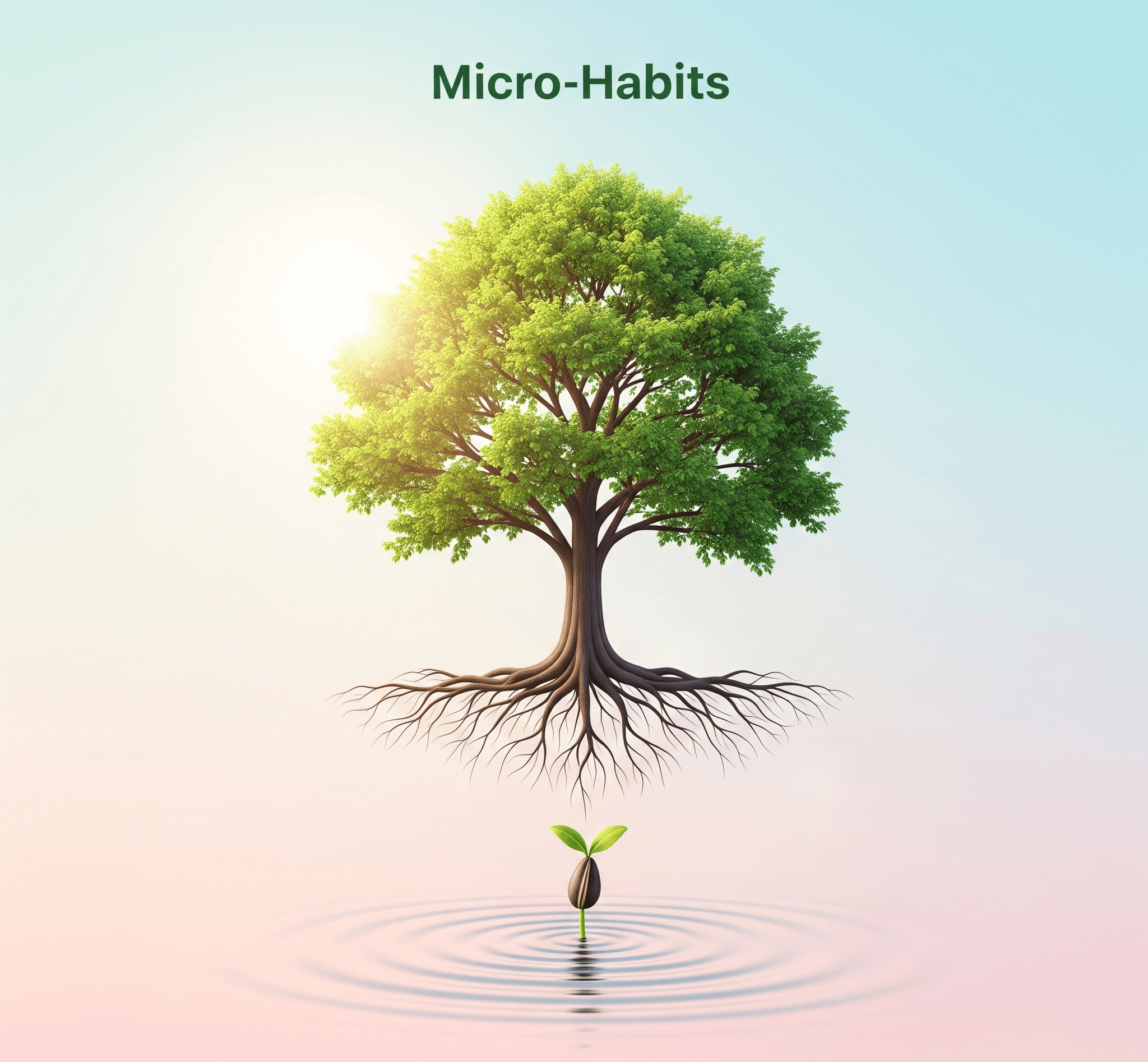The Power of Small Habits: Transform Your Life in 5 Minutes a Day
In a world obsessed with overnight success and dramatic transformations, the idea of changing your life through small, consistent habits might sound underwhelming. But the truth is, Small habits—those tiny, intentional actions that take just minutes to complete—hold the key to unlocking profound personal growth. By dedicating as little as five minutes a day to purposeful habits like journaling, gratitude lists, or mindful breathing, you can spark a ripple effect that reshapes your mindset, productivity, and overall well-being. This blog post explores the science and stories behind micro-habits, offering practical insights to help you harness their power for lasting change. Discover how small habits can lead to big results and learn actionable strategies to optimize your daily routine for success.
Table of Contents
What Are Micro-Habits and Why Do They Work?
Micro-habits are small, manageable actions that require minimal effort and time but, when practiced consistently, compound into significant outcomes. Unlike ambitious resolutions that often fizzle out, micro-habits are designed to be sustainable. They leverage the power of incremental progress, aligning with the brain’s preference for gradual change. According to behavioral scientist BJ Fogg, author of Tiny Habits, small actions bypass the resistance we feel toward big changes, making it easier to stick with them long-term.
The science behind micro-habits lies in their ability to rewire neural pathways through repetition. When you perform a small action daily, like writing one sentence in a journal, you strengthen your brain’s habit-forming circuits. Over time, these actions become automatic, requiring less willpower. This compound effect is why micro-habits are so effective for personal development, productivity, and mental health.
Top Micro-Habits to Transform Your Life
Here are five powerful micro-habits you can start today, each taking five minutes or less. These practices are backed by research and real-life success stories, proving that small steps can lead to monumental change.
1. Journaling: Unlock Clarity and Creativity
What It Is: Spend five minutes writing down your thoughts, goals, or reflections in a journal. This could be a stream-of-consciousness brain dump or a structured prompt like “What’s one thing I’m proud of today?”
Why It Works: Journaling boosts mental clarity, reduces stress, and enhances self-awareness. A 2018 study in the Journal of Positive Psychology found that expressive writing improves emotional regulation and decision-making.
Success Story: Sarah, a 32-year-old marketing manager, started journaling for five minutes each morning. She wrote one sentence about her daily intention, such as “Today, I’ll approach challenges with calm.” Within three months, she noticed improved focus at work and landed a promotion. “It was like my brain started filtering out distractions,” she says.
How to Start: Keep a notebook by your bed. Write one sentence about your day or answer a simple prompt. Apps like Day One can make this habit digital and searchable.
SEO Keywords: journaling benefits, morning journal routine, self-reflection practice, mental clarity tips
2. Gratitude Lists: Shift Your Mindset
What It Is: Write down three things you’re grateful for each day, no matter how small. This could be a warm cup of coffee, a kind word from a colleague, or a sunny afternoon.
Why It Works: Gratitude rewires your brain to focus on the positive, reducing anxiety and increasing happiness. A 2003 study by Emmons and McCullough showed that daily gratitude practices lead to higher life satisfaction and optimism.
Success Story: Mark, a 45-year-old teacher, began writing a daily gratitude list after a period of burnout. “I started with simple things, like my dog’s wagging tail,” he says. Over six months, his outlook shifted, and he rekindled his passion for teaching, even starting a side hustle as a motivational speaker.
How to Start: Use a sticky note or a dedicated app like Gratitude. List three things each morning or evening. Be specific to make the practice more impactful.
SEO Keywords: gratitude practice, daily gratitude list, positive mindset, mental health habits
3. Mindful Breathing: Reduce Stress in Seconds

What It Is: Practice a one-minute breathing exercise, such as inhaling for four seconds, holding for four, and exhaling for four (box breathing).
Why It Works: Mindful breathing activates the parasympathetic nervous system, lowering cortisol levels and promoting calm. A 2017 study in Frontiers in Psychology found that brief breathing exercises improve focus and emotional resilience.
Success Story: Emma, a 28-year-old nurse, used box breathing during her breaks to manage stress in a high-pressure hospital environment. Within weeks, she felt more in control and reported better sleep. “It’s like a reset button for my nervous system,” she says.
How to Start: Set a timer for one minute. Sit comfortably, close your eyes, and follow the box breathing pattern. Apps like Calm can guide you if needed.
SEO Keywords: mindful breathing techniques, stress relief habits, box breathing benefits, mindfulness practice
4. One-Minute Movement: Boost Energy and Health
What It Is: Do a quick burst of physical activity, like stretching, jumping jacks, or a brisk walk around the room.
Why It Works: Short bursts of movement increase blood flow, improve mood, and enhance cognitive function. A 2019 study in Medicine & Science in Sports & Exercise found that even brief exercise improves memory and focus.
Success Story: James, a 40-year-old software developer, started doing one minute of jumping jacks every morning. Over a year, he lost 15 pounds and felt more energized during long coding sessions. “It was so easy to start, I couldn’t make excuses,” he says.
How to Start: Choose an activity you enjoy. Set a reminder on your phone to move for one minute after sitting for an hour.
SEO Keywords: micro-workouts, daily exercise habits, quick fitness routines, energy-boosting tips
5. Single-Task Focus: Master Productivity
What It Is: Dedicate five minutes to focusing on one task without distractions—no phone, no multitasking.
Why It Works: Single-tasking improves efficiency and reduces mental fatigue. Research from Stanford University shows that multitasking impairs cognitive performance, while focused work enhances productivity.
Success Story: Lisa, a 35-year-old entrepreneur, began setting aside five minutes each morning to plan her day without distractions. This habit helped her prioritize tasks, leading to a 20% increase in her business’s revenue within six months. “It’s amazing how much clarity five minutes can bring,” she says.
How to Start: Pick one task, set a timer for five minutes, and eliminate distractions. Use tools like Focus@Will to enhance concentration.
SEO Keywords: single-tasking benefits, productivity hacks, focus techniques, time management strategies
How to Build Micro-Habits That Stick
To make micro-habits a permanent part of your routine, follow these proven strategies:
- Anchor to Existing Habits: Pair your new habit with an established one, like journaling after brushing your teeth. This creates a cue that triggers the behavior.
- Start Small: Keep the habit so easy you can’t fail. For example, write one sentence instead of a full page in your journal.
- Track Your Progress: Use a habit tracker like Habitica or a simple calendar to mark your daily wins. Visual progress boosts motivation.
- Celebrate Wins: Reward yourself after completing the habit, even if it’s just saying, “Nice job!” Positive reinforcement strengthens the habit loop.
- Be Consistent: Aim for daily repetition, even if the habit takes just 30 seconds. Consistency builds momentum.
The Compound Effect: Small Habits, Big Results
The beauty of micro-habits lies in their compound effect. Just as a single drop of water creates ripples across a pond, a five-minute habit can transform your life over time. Consider the story of Angela, a 50-year-old retiree who started a daily gratitude practice. After a year, she not only felt happier but also rebuilt strained family relationships by expressing appreciation more often. “It started with a sticky note,” she says, “but it changed how I see the world.”
By investing just five minutes a day, you can cultivate habits that enhance your mental health, boost productivity, and foster personal growth. The key is to start small, stay consistent, and trust the process.
Take the First Step Today
Ready to transform your life? Pick one micro-habit from this list and commit to it for five minutes a day. Whether it’s journaling, practicing gratitude, or taking a moment to breathe, these small actions can lead to extraordinary outcomes. Share your progress in the comments below or tag us on social media—we’d love to hear your success story!






